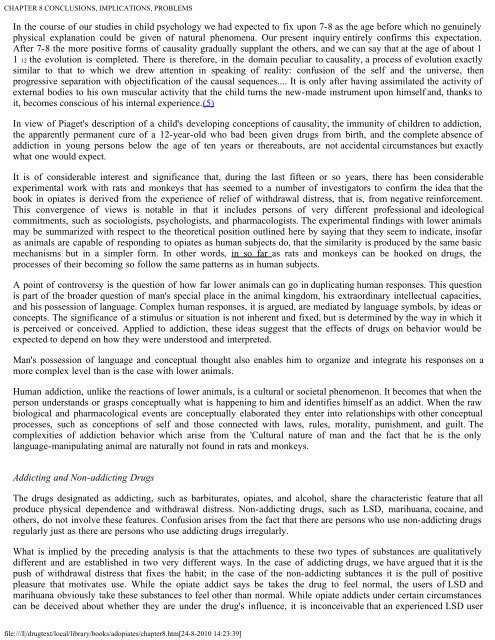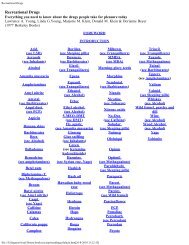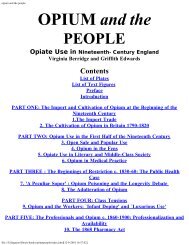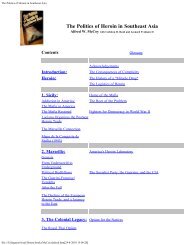Addiction and Opiates
Addiction and Opiates
Addiction and Opiates
Create successful ePaper yourself
Turn your PDF publications into a flip-book with our unique Google optimized e-Paper software.
CHAPTER 8 CONCLUSIONS, IMPLICATIONS, PROBLEMS<br />
In the course of our studies in child psychology we had expected to fix upon 7-8 as the age before which no genuinely<br />
physical explanation could be given of natural phenomena. Our present inquiry entirely confirms this expectation.<br />
After 7-8 the more positive forms of causality gradually supplant the others, <strong>and</strong> we can say that at the age of about 1<br />
1 12 the evolution is completed. There is therefore, in the domain peculiar to causality, a process of evolution exactly<br />
similar to that to which we drew attention in speaking of reality: confusion of the self <strong>and</strong> the universe, then<br />
progressive separation with objectification of the causal sequences.... It is only after having assimilated the activity of<br />
external bodies to his own muscular activity that the child turns the new-made instrument upon himself <strong>and</strong>, thanks to<br />
it, becomes conscious of his internal experience.(5)<br />
In view of Piaget's description of a child's developing conceptions of causality, the immunity of children to addiction,<br />
the apparently permanent cure of a 12-year-old who bad been given drugs from birth, <strong>and</strong> the complete absence of<br />
addiction in young persons below the age of ten years or thereabouts, are not accidental circumstances but exactly<br />
what one would expect.<br />
It is of considerable interest <strong>and</strong> significance that, during the last fifteen or so years, there has been considerable<br />
experimental work with rats <strong>and</strong> monkeys that has seemed to a number of investigators to confirm the idea that the<br />
book in opiates is derived from the experience of relief of withdrawal distress, that is, from negative reinforcement.<br />
This convergence of views is notable in that it includes persons of very different professional <strong>and</strong> ideological<br />
commitments, such as sociologists, psychologists, <strong>and</strong> pharmacologists. The experimental findings with lower animals<br />
may be summarized with respect to the theoretical position outlined here by saying that they seem to indicate, insofar<br />
as animals are capable of responding to opiates as human subjects do, that the similarity is produced by the same basic<br />
mechanisms but in a simpler form. In other words, in so far as rats <strong>and</strong> monkeys can be hooked on drugs, the<br />
processes of their becoming so follow the same patterns as in human subjects.<br />
A point of controversy is the question of how far lower animals can go in duplicating human responses. This question<br />
is part of the broader question of man's special place in the animal kingdom, his extraordinary intellectual capacities,<br />
<strong>and</strong> his possession of language. Complex human responses, it is argued, are mediated by language symbols, by ideas or<br />
concepts. The significance of a stimulus or situation is not inherent <strong>and</strong> fixed, but is determined by the way in which it<br />
is perceived or conceived. Applied to addiction, these ideas suggest that the effects of drugs on behavior would be<br />
expected to depend on how they were understood <strong>and</strong> interpreted.<br />
Man's possession of language <strong>and</strong> conceptual thought also enables him to organize <strong>and</strong> integrate his responses on a<br />
more complex level than is the case with lower animals.<br />
Human addiction, unlike the reactions of lower animals, is a cultural or societal phenomenon. It becomes that when the<br />
person underst<strong>and</strong>s or grasps conceptually what is happening to him <strong>and</strong> identifies himself as an addict. When the raw<br />
biological <strong>and</strong> pharmacological events are conceptually elaborated they enter into relationships with other conceptual<br />
processes, such as conceptions of self <strong>and</strong> those connected with laws, rules, morality, punishment, <strong>and</strong> guilt. The<br />
complexities of addiction behavior which arise from the 'Cultural nature of man <strong>and</strong> the fact that he is the only<br />
language-manipulating animal are naturally not found in rats <strong>and</strong> monkeys.<br />
Addicting <strong>and</strong> Non-addicting Drugs<br />
The drugs designated as addicting, such as barbiturates, opiates, <strong>and</strong> alcohol, share the characteristic feature that all<br />
produce physical dependence <strong>and</strong> withdrawal distress. Non-addicting drugs, such as LSD, marihuana, cocaine, <strong>and</strong><br />
others, do not involve these features. Confusion arises from the fact that there are persons who use non-addicting drugs<br />
regularly just as there are persons who use addicting drugs irregularly.<br />
What is implied by the preceding analysis is that the attachments to these two types of substances are qualitatively<br />
different <strong>and</strong> are established in two very different ways. In the case of addicting drugs, we have argued that it is the<br />
push of withdrawal distress that fixes the habit; in the case of the non-addicting subtances it is the pull of positive<br />
pleasure that motivates use. While the opiate addict says be takes the drug to feel normal, the users of LSD <strong>and</strong><br />
marihuana obviously take these substances to feel other than normal. While opiate addicts under certain circumstances<br />
can be deceived about whether they are under the drug's influence, it is inconceivable that an experienced LSD user<br />
file:///I|/drugtext/local/library/books/adopiates/chapter8.htm[24-8-2010 14:23:39]





